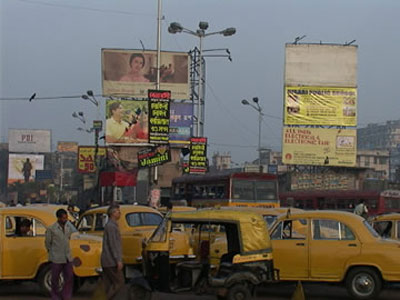(单词翻译:单击)
情景对话
Todd: OK, now Jeff, you made a movie recently. Can you talk a little about what your movie is about?
托德:杰夫,你最近拍了部电影。请你谈谈这部电影的内容。
Jeff: OK, Todd, I want to qualify that it is not a movie. It's a television documentary. Very big difference, but actually a movie and a documentary, there's not a lot of difference. I think the main difference is probably time. There's a beginning and a middle and an ending to both, but television documentary must be done in 46 minutes plus commercials and a movie is two hours or three hours.
杰夫:托德,我要纠正一下,不是电影,而是电视纪录片。这有很大区别,其实电影和纪录片没有太大的不同。我想两者主要的不同应该是时长。电影和纪录片都是由片头、正片和片尾组成,不过电视纪录片的时长要限制在46分钟以内,这是包含了广告的时间,而电影可以长达两三个小时。
Todd: OK, well thanks for that. OK so it's a documentary. What is the documentary about?
托德:好,谢谢你的说明。你拍了部纪录片,那部纪录片讲的什么内容?
Jeff: Our documentary is about Indian life, and about our life interacting with the Indians. We're driving a small auto-rickshaw, which is a three-wheeled. It's a three wheeled car, a mini-three-wheeled car without doors and it doesn't go very fast and it's very uncomfortable and we drive that from the Eastern border at Bangladesh to the western border of Pakistan, and we drive it straight across to Northern India.
杰夫:我们的纪录片是有关印度生活以及我们与印度生活的互动。我们拍摄时驾驶的是电动三轮车,那是一种没有门的小型三轮车,速度不快,坐着也不舒服,我们开着这种车从孟加拉国东部边界前往巴基斯坦西部边界,横穿印度北部地区。
Todd: Wow, that's some idea. Where did you get this idea? Why did you decide "Hey, I'm going to go film you know, going across India?
托德:哇,这个想法不错。你们是怎么想出这个主意的?你们为什么决定跨越印度拍摄纪录片?
Jeff: Well, we'd been to India numerous times and it's an amazing country and we wanted to go back and we wanted to do something, we wanted to do some sort of video or documentary there and we wanted to do something unique that hasn't been done before there and this sort of just popped up in our heads through discussion and kicking around certain ideas, so it was just sort of an inspirational, spur of the moment thing. They're everywhere in India and we saw one and said "Let's drive one across India so it was sort of just came to mind."
杰夫:嗯,我们之前去过印度很多次,那是一个神奇的国家,所以我们想再去的时候做些什么,我们想在那里拍摄视频或纪录片,我们想做些独特的事,以前没人做过的事,然后我们在讨论和随意畅谈时候突然就想到了这个主意,是一瞬间涌现的灵感。这种电动三轮车在印度非常普遍,我们看到后就想到要开着它穿越印度,这个主意是突然想到的。
Todd: Wow! Well if you had to describe your trip or sum up what the whole experience was like, how would you describe it?
托德:哇!要是让你描述这趟旅程还有总结这次的经历,你会怎么来形容?
Jeff: I think the best word to use to describe the trip was stupid! I don't think anyone would recommend doing it to anyone. I wouldn't do it again and it was very dangerous. It was very uncomfortable. It was very hot, very noisy. It did nothing. I think the main thing it did was take a few years off my life but it was an experience. It wasn't fun but it was a good experience.
杰夫:我觉得最贴切的形容是,这趟旅程非常愚蠢!我认为没有人会向其他人推荐这种做法。我不会再来一次,因为这样做太危险了。非常不舒服,而且又热又吵。这次旅行没有什么意义,我最主要的感受是这趟旅行让我减寿好几年,不过这毕竟是次经历。虽然不好玩,但却是次不错的经历。
Todd: Alright. Thanks Jeff.
托德:对。谢谢你,杰夫。

译文属可可原创,仅供学习交流使用,未经许可请勿转载
重点讲解
重点讲解:
1. interact with 相互交流;相互沟通;互动;
例句:Teachers have a limited amount of time to interact with each child.
教师和每个孩子沟通的时间有限。
2. pop up 突然出现;不意冒出;
例句:You solved one problem and another would immediately pop up.
你解决完一个问题,另一个问题又会马上冒出来。
3. kick around 非正式地讨论;随便谈谈;
例句:They started to kick around the idea of an electric scraper.
他们开始讨论弄一个电铲。
4. come to mind 突然想起;(想法)一下子冒出来;
例句:I just picked up whatever goods come to mind.
我只是想到什么就拿什么罢了。
5. sum up 总结;概括;
例句:She summed up the situation in a few choice phrases.
她言简意赅地总结了情况。


